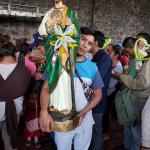This has been a big year for my gay Catholic life, lol. I hinted at some of what has made this year so wonderful on a personal level here; on a more public level, I’ve been so grateful to be a part of Building Catholic Futures, a project to serve the next generation of queer Catholics. BCF has allowed me to spend even more time on in-depth reflection about our community’s experiences and needs. So here are a few observations–not advice, just stuff I think I’ve noticed or things I’ve been noodling on. I welcome your comments!
1. One thing that surprised me when BCF did our first retreat was how many of our stories involved guidance from dissenting Catholic sources. So like, to be at this retreat at all, you had to personally identify as gay/bi/les/ssa, and accept Catholic teaching on sexuality (lol on everything, but specifically on sexuality). And yet when we talked about which books, films, etc had helped us understand our own journeys, so many of us named things that either explicitly rejected that teaching or simply ignored it.
Not sure why this surprised me! My own understanding of My Queer Catholic Life has been deeply shaped by Alan Bray (whose work I found through Andrew Sullivan), not to mention “My Beautiful Laundrette” and all the other artwork I discuss here. Other people cited everything from The Church and the Homosexual to “Love, Simon.”
I guess I had internalized a sense that our position is fragile, and if people get a glimpse of those greener pastures of unorthodox life, they’ll hightail it. Which is weird since that is not my own story. (Attempting) obedience to Mother Church is my greener pasture! We can use everything we find on our journeys to help us grow in this place.
This note is also a note about how much our experiences and needs as queer people can overlap, across divides of religious conviction.
2. Two ways of thinking about Heaven. In Tenderness I talk a fair amount about celibacy as a witness to the life to come, where “there is neither marrying nor giving in marriage.” Celibacy is a kind of forepractice of resurrection. Any deprivation we experience in this life due to celibacy, or due to the marginalization and injustice we may experience as gay people, can itself be offered as imitation of Christ’s poverty and degradation; we die with Him to be raised with Him.
This is a pretty deep aspect of my own spiritual life. My friend Wes Hill wrote a lovely thing a while back about my first novel’s “spirituality of humiliation,” for example. But in Tenderness I did also flag that this understanding of celibacy holds certain dangers for queer believers. It can lead to a kind of “pie in the sky when you die” attitude, where our churches don’t need to support us or guide us in avoiding despair and experiencing love here and now, because we’re just kind of waiting around for Heaven. Other people may begin to treat our isolation and unhappiness as signs of our holiness. We may start to assume that all of our suffering is necessary, that our queerness is defined by suffering and sacrifice, since to be queer is (we may start to believe) to be a kind of icon of *~*sexual brokenness*~*.
And so I love the way Dunstan Thompson’s later poetry depicts Heaven. For him, Heaven is a place of welcome and friendship above all. Heaven is not the opposite of this life’s misery but the fulfillment of a promise made by this life’s joys. He experienced love in this life, more love than he could have imagined–and trusted in the still greater love to come.
Most of us need both of these understandings of Heaven, because most of us will have times when our lives seem bleak and times when they seem full of promise. Thompson also writes about Heaven as refuge, as relief, rescue after shipwreck. Heaven can rescue all those Francis Spufford’s atheist bus leaves behind; and we learn something about what Heaven is like from our imperfect experiences of ordered love here and now.
3. I often use this phrase, that what I am trying to help queer people live out is “a self-accepting obedience.” And people have pointed out that this is an idiosyncratic phrase of mine. What does it mean really? Well, I’m creating a workbook companion for Tenderness, and I wrote a few pages about this question there, but for now I will say two things:
First, if you’re Christian and you experience oppression or mistreatment in the churches, it’s easy for the line between humility and self-hatred to blur. I wrote about this in my essay on Ursula de Jesús, and it came up a lot when I edited Christ’s Body, Christ’s Wounds: Staying Catholic When You’ve Been Hurt in the Church. Many of us who want to live in obedience have to learn the hard, unwanted lesson that obedience is not a form of self-harm. Our self-loathing is a rejection of the imago Dei we bear, not an act of fidelity to God.
And second, like all good Gen Xers, I abhor words like “self-acceptance.” No participation trophies for me, thanks! Self-esteem, self-care, all that Jesse Jackson stuff, no way. What does it mean to “accept yourself”–does it mean pretending you’re perfect just as you are? Does it mean giving up on God’s power to change your life, or denying your need for that change?
What started to shift my understanding of this idea is a line from David Carr’s addiction memoir, The Night of the Gun: “I could be drunk tomorrow or shooting dope as you read this, but the chances of that are low as long as I make a daily decision to embrace who I really am.” I first read this line in the last year of my own Drinking Career, and I misunderstood it. I thought Carr meant that he could embrace who he was now, now that he was sober. Slowly, as some of my own damage got cleared away, I began to interpret him as describing a “daily decision” to embrace the truth of his situation. Whatever the truth is, if I can embrace it instead of refusing to see it, I can find a path upward. The way to Christ, Who is Logos and Truth, is through living in the truth of our real condition and situation, not denying it.
When I say this phrase, “self-accepting obedience,” to gay people who have experienced that desperate desire to deny the truth of their experience, they almost always get it. It’s about living in truth, instead of in the false self you tried to show to your parents or your pastor or yourself. It’s about obeying God from a clear-eyed embrace of the real situation He has given you. Harder than it might sound, my heterosexual and/or “normal drinker” friends!
4. At that BCF retreat, I was struck by the fact that clear patterns arose in our needs as non-straight Catholics seeking to live in harmony with the Church, but there were no clear patterns in our reasons for desiring that harmony. Our reasons for attempting obedience were all different. And I remember this being true of Christ’s Body as well: When people talked about their pain and confusion, the stories sounded a lot more similar than when they talked about what makes them nonetheless believing Catholics.
This is heartening to me, I think. There are so many doorways into the Church. Gay people use all the same ones that straight people do! Only once inside do our experiences begin to converge–perhaps because oppression always tends to deny individuality, whereas the Holy Spirit highlights it.
5. We’re hammering out the various principles guiding BCF’s work, and distinguishing it from what already exists. I like a lot of these principles (be unexpected, be trustworthy) but the one that I have found really resonates with people who are trying to navigate these conversations is, “From chastity to vocation.” So much Catholic discourse toward and around gay people is chastity discourse! And chastity is a necessary part of our walk with Christ (…obviously, lol?) but it can’t be the whole. To assume that gay people especially need help with chastity is a denial of our individuality; to assume that we only need chastity, and not hope or justice or a way to give and receive love or a mission within the Church, is fairly dehumanizing.
The ways queer people have been called to give and receive love are the true stories of our lives, because “His banner over me was love.”
(If that sounds good to you, and you would like updates on BCF’s work, email me! eve_tushnet@yahoo.com )
Rainbow over a Methodist Episcopal church photographed by Kenneth V. Abbott and used under a Creative Commons license.
















